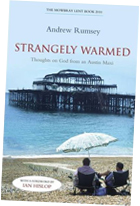| |
|
|
| And then we'll take over the world |
 |
July 2001
We're bigger than Jesus. Even when repeated some 35 years later, many a red-blooded believer (including those who, like myself, also count themselves devoted Beatles fans) might feel the urge to sneer back, "oh yeah?" John Lennon's infamous offhand jibe was theological sand kicked in its face and the Church, being only (or mostly) human, could be forgiven for channelling quite a lot of time and energy into proving that, far from fading away, it is gonna be huge.
Just occasionally, during this generation or two of relative decline, the Western Church has played the numbers game rather too readily. It is a commonplace for evangelical leaders to play Brian Epstein and chivvy their congregations with tales of 10,000-strong churches in Asia ("we may not sell many records here, but we're massive in Singapore"), but Christian mission is to be a matter of quality as much as quantity. As the late Lesslie Newbigin darkly observed: "the multiplication of cells unrelated to the purpose of the body is what we call cancer."
The point is that the Church's missionary vision is of a kingdom, not an empire – a subtlety which Christendom has not, it is fair to say, always picked up. Empire looks to expand its own power and territory; kingdom (that of God, at least) does not need to gain the world, for that world is already the Lord's. It is comprehensive, not coercive, and concerned with the shaping of culture and the slow permeation of godly ways of life. Jesus likened it to yeast working through a batch of dough, or a seed growing secretly.
As such, the ultimate vitality of the Church depends not on the success of a human institution but on the truth about God's reign: a point which underlay William Temple's miniature classic, Christianity and Social Order, now approaching its 60th anniversary of publication. Temple, an architect of the British welfare state and perhaps the most brilliant and influential Archbishop of Canterbury of the last century, here outlined a pattern for British society based on a trinity of basic kingdom values: personal freedom and dignity under God, fellowship and community, and public service.
This agenda was not to distract the Church from saving individual souls (which Temple saw as essential), nor as a sort of false beard to disguise the true face of evangelism; but as an implicit way of articulating the "yeastiness" of God's Kingdom.
It was at the local level, argued Temple – in the "lesser associations" of family, county or college – that this made most sense. If all this sounds vaguely familiar, Temple's vision is not so very far removed from recent debates in Britain about "a new partnership" between government and "faith groups" – one of a clutch of newspeak titles that makes the complex tapestry of our religious life sound like a folk festival.
Jargon aside, however, it is very heartening to see the new appreciation that the "distinct insights of faith" (i.e. the fact that it has a worldview) might actually enrich civil society rather than contaminate it. This is the gist of the Oasis Trust's new Faithworks campaign, which has deftly captured the mood and brought forth agreeable noises from priests and politicos alike.
Temple would, one imagines, have approved; and it really is encouraging to see Christian mission rediscovering what we might call the "church fete factor". By this, I don't quite mean that guessing the weight of the cake or wangling the welly are, of themselves, salvific pursuits (you may wish to disagree), but rather the vision such events showed for a shared life, a commonwealth, which encompasses those who may never know the pain of the pew. The wholesale decline of this shared life over the last 40 years – especially in diverse urban communities – has had a cost few wish to calculate.
Carefully applied, this rediscovery could even prove the best way to truly integrate the plurality of religions we now host, for Christian hospitality is arguably a far better model than the principles of the free market, which continue to be wearily slapped onto areas of life they were never intended for.
Christian society is an idea we need to have again – and one which has some surprising benefits. After all, it was by virtue of their belonging within such a community that (at the 1956 church fete in the Liverpool parish of Woolton) the teenage John Lennon had his first gig and met a certain Paul McCartney. Without the tea urn and the tombola – and, naturally, the kingdom of God – the fab four might still be stuck in the Cavern. Bigger than Jesus indeed... pass me a scone, would you?
Visit the Faithworks website |
|
|
 |
 |
 |
| Strangely Warmed by Andrew Rumsey is now available as a book. |
 |
 |
 |
 |
 |
| Stephen Tomkins' regular column of tales of religious lunacy from the far reaches of the Net |
 |
 |
 |
| Mark Howe's regular rant about Internet culture |
 |
 |
 |
| Also by Stephen Tomkins... a regular round-up of the saints of yore who were one wafer short of a full communion |
| |
|
|
|
|


